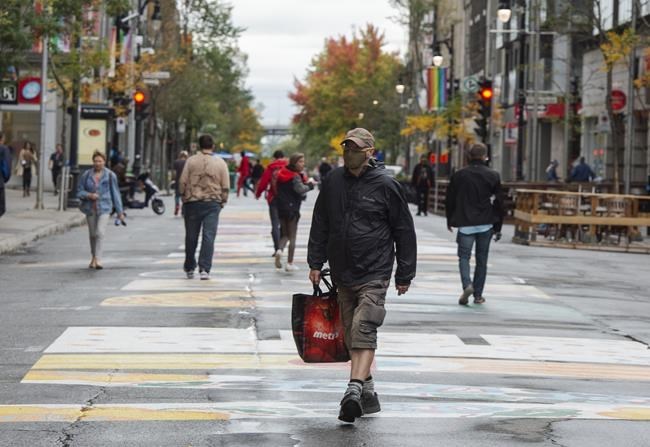MONTREAL — Quebec's premier promised to crack down on those who violate public health orders and Ontario released sobering COVID-19 projections as leaders of Canada's two hardest-hit provinces on Wednesday grappled with how best to flatten a growing second wave.
Francois Legault said starting Thursday, Quebec police can obtain "telewarrants" permitting them to enter people's homes to enforce new lockdown orders.
Anyone living in three regions in the highest pandemic alert level -- including the Montreal and Quebec City areas -- face fines of $1,000 if they are caught gathering indoors with people from another household. The lockdown orders are in effect for at least 28 days.
Legault said if police suspect an illegal gathering they will be able to contact a judge and quickly obtain a warrant "that same evening."
"If you're inviting guests for a party, you're breaking the law," Legault told reporters in Quebec City.
Legault announced earlier this week that Quebec will shut down bars, restaurants and most in-home gatherings in its two largest cities for 28 days amid a steady rise in COVID-19 cases and hospitalizations.
Beginning on Thursday, bars, restaurant dining rooms, concert halls, cinemas and museums in Montreal and Quebec City will close, and people cannot have any visitors at their homes from another address, with the exception of a caregiver or service provider.
People cannot gather outdoors with members outside their household, and anyone who attends a protest march must wear a mask. Those who don't comply with a warning to disperse will be fined, Legault said.
"We cannot accept that a majority of people pay for the negligence of a minority," he said. The province reported 838 new cases on Wednesday, as well as a 15-person increase in hospitalizations.
Meanwhile Ontario, which reported over 600 cases on Wednesday, released new projections that predicted daily new case counts could reach 1,000 in the first half of October if no changes are made.
The projections noted the province has seen an upward trajectory in COVID-19 infections in recent weeks, with cases currently doubling every 10 to 12 days.
Dr. David Williams, the province's chief medical officer of health, says further measures to fight the pandemic could be announced as the data is analyzed.
But he noted the government has already recently introduced new restrictions, such as closing strip clubs and limiting hours of operation for bars and restaurants, that are not reflected in the modelling.
"We did those steps, and we're looking at even further ones," he said, while declining to provide specifics.
Premier Doug Ford stressed that Ontarians still have time to avoid worst-case scenarios by carefully adhering to public health directives.
"How bad the second wave is, how far it spreads, is up to us," he told a news conference.
"And the actions are simple: practise physical distancing, wear a mask, stay home if you're sick, get a flu shot, look after our elderly and vulnerable."
As cases have been rising in both provinces, the premiers of both Quebec and Ontario have highlighted the need to find a balance between ensuring public health and protecting the economy and people's well-being.
Legault opted for a plan he said would shut down prolonged face-to-face interactions, while leaving schools, stores and most workplaces open.
The province's measures were met with dismay from Montreal restaurant owners, who claim they have been unfairly targeted when their establishments haven't been linked to any major outbreaks.
Some have said they face going out of business, just after they've invested large sums into retrofitting their spaces to better meet public-health guidelines.
Legault said the closures were not a "values judgment," but rather an attempt to reduce people's contacts.
Ford on Wednesday said that while "everything is on the table" in terms of possible measures, for the moment he is holding off on announcing new closures of rolling back the province to a previous stage of its reopening plan.
"How do you measure the mental health effects of people going bankrupt, not being able to bring home a paycheque, not putting food (on the table), losing their homes, being kicked out of their houses due to not being able to pay rent?" he asked.
Meanwhile, Manitoba recorded 40 new cases of COVID-19, including 31 in the Winnipeg area.
Nova Scotia and Newfoundland and Labrador reported one new case each.
Health Canada also announced on Wednesday that it had given the green light to a rapid test for COVID-19 that promises to deliver results in under 15 minutes.
The tests promise to take some of the pressure off in Ontario and Quebec, which have struggled with long lines and delays in test results and contact tracing.
The department did not specify when the Abbott Diagnostics ID Now test kits would start arriving, other than to say it would be in "the coming weeks."
This report by The Canadian Press was first published Sept 30, 2020
Morgan Lowrie, The Canadian Press

